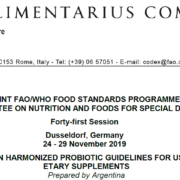Update on harmonized guidelines for probiotics being developed by the Codex Alimentarius
By Prof. Gabriel Vinderola, PhD, Associate Professor of Microbiology at the Faculty of Chemical Engineering from the National University of Litoral and Principal Researcher from CONICET at Dairy Products Institute (CONICET-UNL), Santa Fe, Argentina
In December 2017, at the 39th session of the Codex Committee on Nutrition and Foods for Special Dietary Uses (CCNFSDU) in Berlin, members of the Committee agreed to include in the agenda a discussion of harmonized guidelines on probiotics for use in foods and food supplements. Argentina supported this initiative and proposed itself to lead the work, building a guideline based on the present Argentinian framework on probiotics.
The first draft of the document was presented in 2018. Some countries supported the work to develop harmonized guidelines with a definition and minimum requirements for characterization, quality, and labeling, while other countries did not support the initiative, arguing that there was no perceived need to start this new work, it was not a priority for the Committee at that moment, and the document should be revised to provide more clarity on the need to start work on this topic.
Early in 2019, Argentina convened a panel of local experts to contribute to the discussion of the paper based on the issues raised in the first round of revision. I participated in that panel.
In November 2019, at the 41th meeting of the CCNFSDU, an updated version of the paper was presented. This revision clarified that the goal of the work was to produce a regulatory framework for the use of probiotics in food and food supplements. This objective is in line with the purpose of the Codex Alimentarius to guarantee safe and quality food and to ensure equity in international food trade.
In the course of the debate, some delegations favored the topic, stressing the value of regulatory harmonization within the Codex. They pointed out that framework could be based on the existing probiotic definition and guidelines of FAO and WHO, providing clear guidance and principles focused on the use of probiotics as ingredients. Delegations that opposed the new work noted that the Codex had already adopted principles and guidelines of a similar (horizontal) nature on issues such as labeling, claims, contaminants, safety and hygiene covering all foods, including food supplements, and that probiotic-specific regulations were not needed. FAO and WHO had also conducted work in this area.
After the debate, the Committee considered that the document presented needed further clarification, especially with regard to the scope and the issues raised in the discussion. Finally, it was agreed that Argentina and Malaysia would revise the document to be presented at the next plenary meeting of the Committee (42th meeting), to be held in November 2020. It was agreed that in order to assess the need to work on this topic, the new proposal should include a justification for additional probiotic-specific criteria in accordance with the mechanism for assigning Committee priorities.
Due to the COVID-19 pandemic, the 42th meeting has been postponed until November 2021, and a deadline of March 2021 was set for submitting the revised paper to the CCNFSDU.
The information reported in this post was kindly provided by Andrea Moser, Argentinian representative at the Codex Committee on Nutrition and Foods For Special Dietary Uses.






